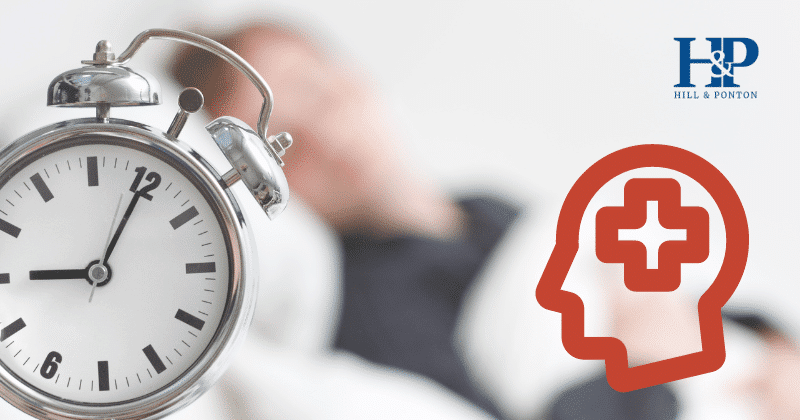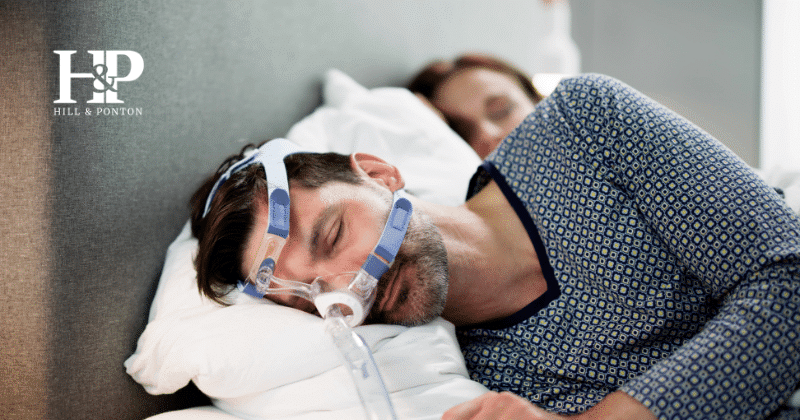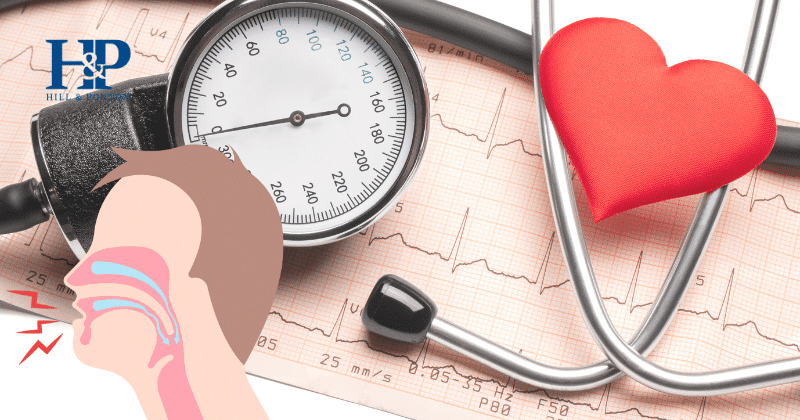In the diverse realm of veterans’ health, two significant concerns consistently emerge: sleep apnea and mental illness.
Both these conditions, individually, are pervasive among our brave veterans.
Yet, recent insights suggest that there’s more to this relationship than meets the eye.
The connection of mental illness secondary to sleep apnea in veterans has come to the forefront of discussions within the Veterans Health Administration.
Sleep apnea, particularly obstructive sleep apnea, is a sleep disorder that impedes one’s ability to breathe normally during sleep.
This can lead to various symptoms, from sleep deprivation to daytime sleepiness.
On the other side of the spectrum, mental health disorders, ranging from anxiety disorders to more severe psychiatric disorders, impact the psychological well-being of many service members.
But what happens when these two conditions intersect?
And more importantly, what are the implications for disability benefits and VA disability ratings?
This article seeks to shed light on these pressing questions, emphasizing the importance of understanding the intricate interplay between sleep health and mental health for veterans.
We’ll explore how sleep disorders, especially sleep apnea, intertwine with mental illness, impacting both health outcomes and VA disability considerations.
Understanding Sleep Apnea
Sleep apnea is a prevalent concern among veterans, characterized by repeated interruptions in breathing during sleep.
These interruptions lead to fragmented sleep, causing symptoms such as:
- Frequent nighttime awakenings
- Excessive daytime sleepiness
- Loud, disruptive snoring
- Mood changes and irritability due to sleep deprivation
Beyond the night, sleep apnea impacts a veteran’s daily life.
It can influence mental health, exacerbate symptoms of anxiety and depression, and hinder day-to-day functioning.
Furthermore, untreated sleep apnea may pose risks to physical health, including heart problems and high blood pressure.
For veterans navigating the VA disability landscape, understanding sleep apnea’s nuances is essential.
It can affect VA disability ratings and intertwine with other health conditions, potentially influencing disability benefits.
For a detailed understanding of sleep apnea and its comprehensive impact, check out our extensive guide on the topic.
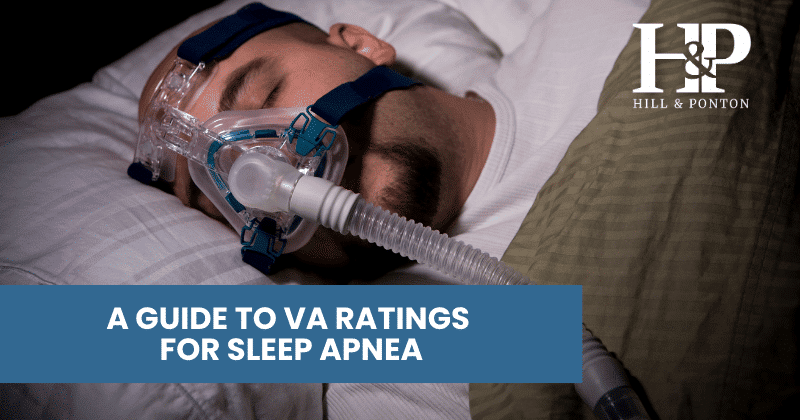
A Guide to VA Ratings for Sleep Apnea
A Look into Veteran Mental Health
Many veterans face challenges related to mental health after their military service.
These challenges can manifest as anxiety, depression, posttraumatic stress disorder (PTSD), and other psychiatric disorders.
The intertwining nature of sleep disorders and mental health conditions is a significant factor for veterans seeking a rightful VA disability rating.
Symptoms and Common Presentations
- Mood Swings and Emotional Instability: This is a common symptom of depression, bipolar disorder, and other mood disorders.
- Persistent Worry or Fear: These feelings are often associated with anxiety disorders, which might lead to physical symptoms like rapid heartbeat or sweating.
- Flashbacks and Nightmares: Particularly seen in PTSD, where individuals relive traumatic events, sometimes leading to sleep disturbances.
It’s crucial to differentiate between various mental health conditions in veterans.
Some symptoms overlap, making correct diagnosis and understanding essential.
For a deeper dive into distinguishing these disorders, check out our guide on differentiating mental health disorders in veterans.
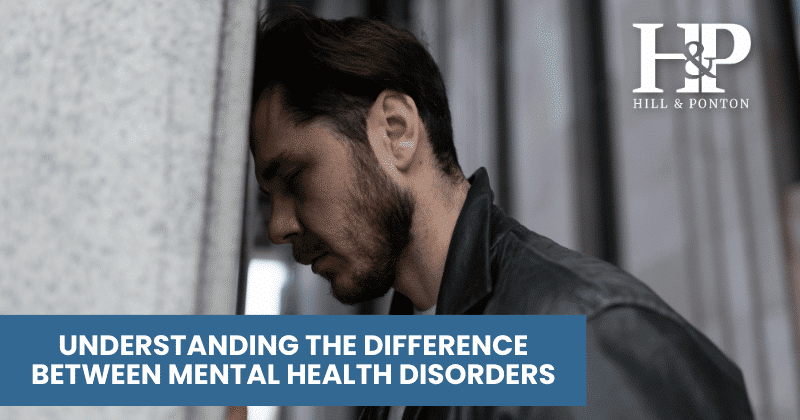
Understanding the Differences Between Mental Health Disorders
Impact on Daily Life and Activities
Mental health conditions don’t just remain confined to one’s mind; they significantly impact daily life:
- Relationship Challenges: Conditions like PTSD or depressive disorder might strain personal relationships, making communication and understanding essential.
- Difficulty in Work or Social Settings: Anxiety disorders, for instance, can lead to challenges in crowded places or during stressful situations.
- Sleep Disruption: Many mental health conditions, especially PTSD, cause significant sleep disturbances. If you’re curious about the intricate relationship between PTSD and sleep apnea, we recommend reading our dedicated post on service-connecting sleep apnea to PTSD.
Mental health is a vast and complex topic, with various disorders presenting differently yet interlinked in several ways.
Understanding these conditions is not just essential for one’s well-being but also when seeking VA disability benefits.
Dive deeper into individual disorders with our guides on depression and anxiety below!
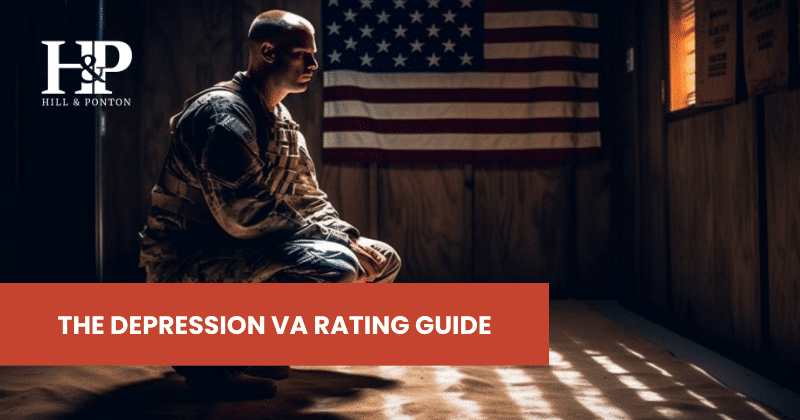
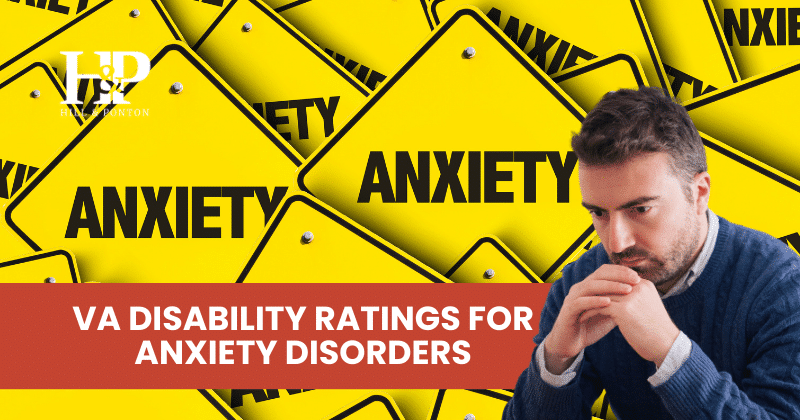
The Relationship Between Sleep Apnea and Mental Health
Sleep apnea and mental health challenges, such as depression, anxiety, and PTSD, often co-exist among veterans.
It’s not merely a coincidence. A synergy exists between these disorders, magnifying their individual impacts.
Highlighting the Connection
Studies have pointed out that while 4% of American men suffer from sleep apnea, the prevalence of this sleep disorder in individuals with depression (22%), anxiety disorders (17%), and PTSD (11%) is notably higher.
Disorders such as PTSD lead to higher instances of sleep disturbances and fragmentation.
Sleep becomes one of the primary victims of severe mental illnesses, with symptoms like sleep difficulty, sleep deprivation, and frequent awakenings common among those with depression, anxiety, and PTSD.
Sleep apnea does not merely affect one’s physical health. Its repercussions on sleep quality can exacerbate mental health symptoms.
Conditions like depression and anxiety can be intensified due to the disturbed sleep cycles caused by sleep apnea.
Medical Insights
Several reasons exist for the close link between sleep apnea and mental health.
Sleep-deprived patients often experience increased frequency and length of apneic events, similar to alcohol’s effects.
Sleep deprivation can impair specific muscles, intensifying obstructive sleep apnea.
Some commonly prescribed anti-anxiety medications have been found to amplify the severity of sleep apnea.
For instance, certain studies have indicated that benzodiazepines might even induce sleep apnea in individuals who did not previously suffer from it.
Elevated levels of stress, whether from PTSD-related anxiety or occupational pressures, can contribute to sleep-disordered breathing.
The intricate relationship between sleep apnea and mental health necessitates a comprehensive understanding for veterans, especially when navigating the Veterans Affairs system for disability benefits.
Recognizing and addressing this interconnection is crucial for optimal mental and physical health.
Interested in filing for mental health disorders secondary to sleep apnea but have been denied? Contact us today!

Why is Mental Health Linked to Sleep Apnea?
Sleep apnea and mental health disorders, while distinct, often intersect in their manifestations.
Unraveling this link can help veterans better understand their conditions and seek appropriate treatment.
Physiological Triggers
Chronic stress, common in PTSD and anxiety disorders, can lead to an overproduction of stress hormones, which have been implicated in disrupting sleep patterns, thereby potentially exacerbating sleep apnea symptoms.
Mental health disorders, particularly PTSD and depression, can lead to alterations in sleep architecture, such as reduced REM sleep.
This can compound the frequency and severity of apneic events.
Psychological Triggers
For some, the fear of not being able to breathe during sleep or experiencing nightmares (common in PTSD) can lead to “sleep anxiety.”
This anxiety can, in turn, worsen sleep fragmentation and apnea episodes.
Drugs prescribed for mental health disorders, such as benzodiazepines for anxiety, can influence the muscles responsible for keeping airways open, thus potentially intensifying sleep apnea.
Environmental Triggers
Certain lifestyle factors prevalent among veterans with mental health conditions, such as substance use or inconsistent sleep routines, can further disrupt sleep and worsen apnea.
Traumatic incidents or extended periods of heightened alertness during military service can lead to both sleep disturbances and mental health challenges.
The compounded effect of these experiences can make a veteran more susceptible to sleep disorders.
For a deeper understanding of specific mental health conditions and their relationship with sleep apnea, we invite our readers to explore our comprehensive guides on Depression, Anxiety, and the intricacies of differentiating various mental health disorders in veterans.
Can Mental Health Be Service-Connected Secondary to Sleep Apnea?
When considering VA disability ratings, the distinction between primary and secondary service-connected conditions is vital.
For veterans, understanding how these conditions interrelate can have a significant impact on their disability benefits.
VA’s Perspective on Service-Connected Conditions
The Veterans Affairs (VA) recognizes primary conditions that are directly linked to military service.
However, if a primary condition, such as sleep apnea, leads to a secondary condition (like a specific mental health disorder), this secondary condition might also be eligible for VA disability benefits.
For a condition to be considered secondary, there must be clear evidence that it directly resulted from a service-connected primary condition.
Precedence on Sleep Apnea and Mental Health
Over the years, there’s been an increasing recognition of the intersection between sleep disorders and mental health among veterans.
Cases where mental health has been service-connected secondary to sleep apnea have been successful, emphasizing the validity of this connection.
However, individual case evaluations are crucial.
Not every veteran with sleep apnea will automatically be granted a secondary service connection for mental health. The evidence must clearly demonstrate the relationship.
Recent Developments and Decisions
The VA continually revisits and revises its stance based on new research and evidence.
Recent decisions have seen a more comprehensive understanding of how sleep apnea can influence mental health, leading to more favorable outcomes for veterans making these claims.
Proving Mental Health Secondary to Sleep Apnea
When striving to prove the connection between sleep apnea and subsequent mental health challenges, preparedness and thorough documentation are vital.
This ensures that the Veterans Affairs (VA) comprehends the full gravity of the situation and the intertwined relationship of these conditions.
Gathering Evidence
- Medical Documentation: Always maintain up-to-date records of all sleep apnea and mental health treatments. Documentation should reflect the progression of your symptoms and the direct relation between the two conditions.
- Personal Statements: These offer a glimpse into the real-life impact of sleep disorders on mental health. Personal narratives can solidify the relationship between sleep apnea and its consequences on your mental state.
Want more information about the importance of evidence in the claims process? Check out our guide below.
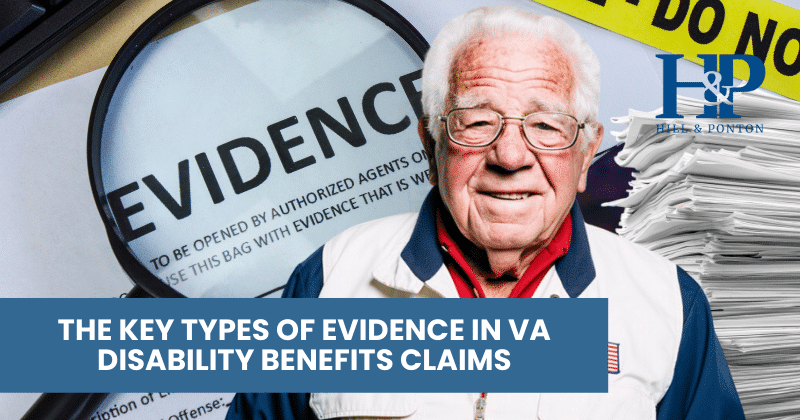
The Key Types of Evidence in VA Disability Benefits Claims
Importance of Expert Opinions
Consult with sleep medicine specialists and mental health professionals.
Their insights can bolster your claim by providing a medical perspective on how sleep apnea might be exacerbating mental health conditions.
Ensure these professionals have access to your medical history and are aware of the specificities of your military service, as this can play a crucial role in their evaluations.
Want advice on how to get an excellent nexus letter crafted by a medical professional? Read our guide below.

The Key to a Winning Nexus Letter
Monitoring and Consistency
Regular health check-ups can showcase the ongoing effects of sleep apnea on mental health.
Persistent documentation helps in establishing the longevity and severity of the issue.
Secondary Evaluations
Don’t shy away from seeking second opinions.
Different medical professionals might shed light on various aspects of the intertwined relationship between sleep and mental health.
Secondary evaluations not only solidify your case but also ensure you receive comprehensive care.
Value of Personal Statements
Enlist testimonials from close friends, family, or fellow service members who’ve witnessed the direct impact of sleep disorders on your mental well-being.
These accounts can provide a more holistic understanding of your day-to-day challenges.
If you want to learn more about the importance of lay statements, check out our guide below!
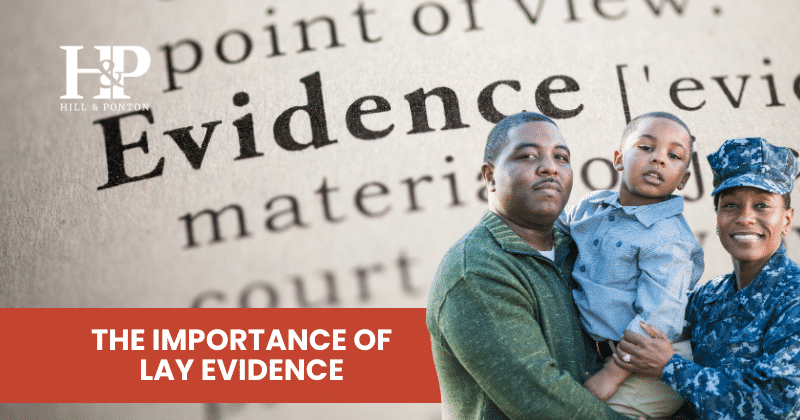
The Importance of Lay Evidence
Understanding the intricate relationship between sleep apnea and subsequent mental health issues is crucial for veterans seeking the rightful VA disability rating.
The intertwined nature of these conditions can have profound effects on daily life, emphasizing the importance of recognizing and addressing them collectively.
Veterans must remain proactive in monitoring their health, documenting changes, and seeking professional opinions.
Knowledge, backed by strong evidence, can significantly bolster a VA disability benefits claim, ensuring that the consequences of sleep disturbances on mental health are not overlooked.
Have Questions About Understanding How the Claims Process Works?
Hill & Ponton are here to support you with getting started with your claim.
If you are intending to appeal a denied claim, you can contact us for an evaluation and we can help you with this process.
However, if you are considering filing an initial claim, or even if you are interested in learning about the appeals process, we offer a free ebook to get you started on the right foot!
The Road to VA Compensation Benefits will help break down the claims process from start to finish. Click the link below to learn more.

